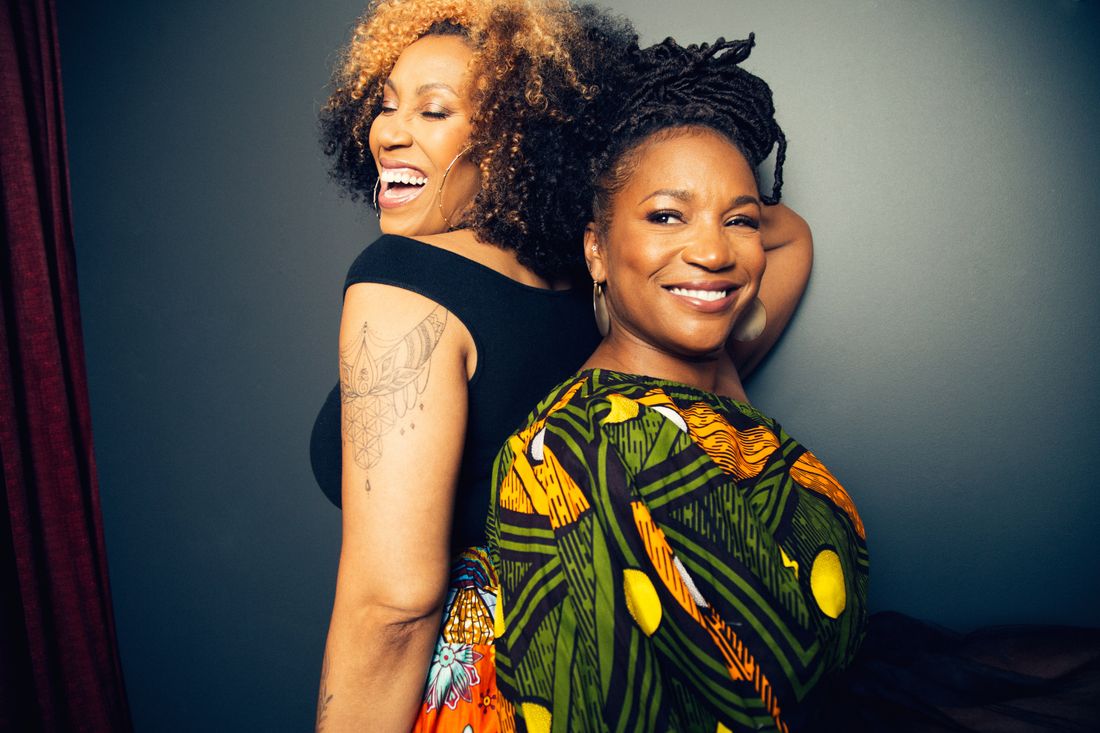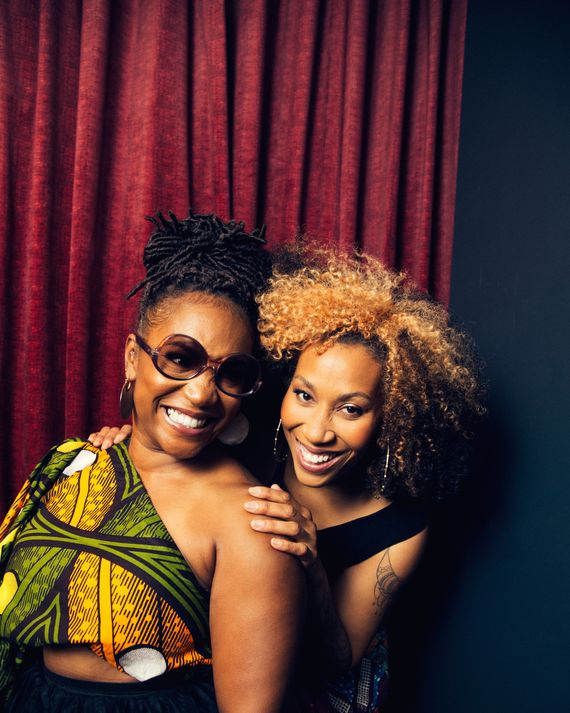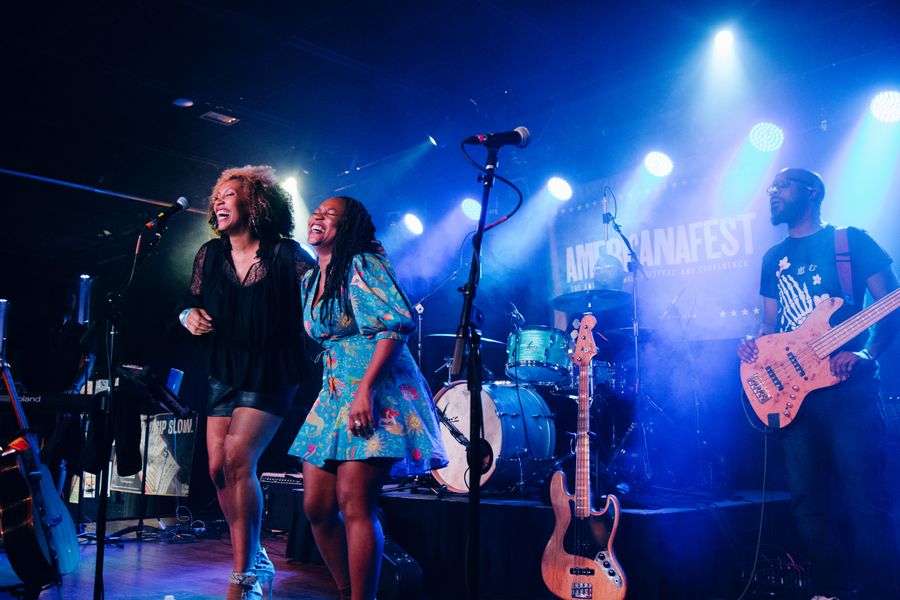
There is always crying when Rissi Palmer and Miko Marks are together.
On August 12, onstage at country music’s vaunted Grand Ole Opry, Miko joined Rissi’s set to sing their new, yet-to-be-released track, “I’m Still Here.” They managed to hold it together through the performance, their voices perfectly blending in soulful, soaring declaration: “Made it through the mud and tears / Tried to make me disappear / Counting me out for all these years, but whom shall I fear?” Once the song was over, however — once Rissi surprised Miko with an invitation to make her official Opry debut on October 14 — the tears flowed freely.
Later, backstage, as Rissi recounted the early seeds of their friendship, there was more crying still. Miko didn’t know Rissi in 2007, the year she had her own Opry debut. Miko was on her way out of Nashville, headed back home to the Bay after years of hitting her head against walls constructed specifically for artists who looked like her. But Rissi was just getting started, and Miko wanted to send her blessings. She and her husband had two dozen roses delivered to Rissi’s Opry dressing room along with a note: “We are proud of you, and we see you.”
“We talked about this onstage,” Rissi says, “but I just wanna reiterate this because it’s a very important part of why I do what I do with Color Me Country and with everything: It’s because of her. Everybody wanted us to be in competition and not be friends.”
It was crowded in that Opry dressing room back in mid-August as friends and family and fellow artists huddled to celebrate not just Rissi and Miko, but Rissi and Miko, this connection that defies the odds and norms of an industry that doesn’t really care for Black people, to say nothing of its feelings for Black women. Even now, as the genre is still deciding whether it even wants to find its footing in a more aware, more radicalized post–George Floyd America, the pair have only grown closer. They’ve also evolved and matured, learning how to navigate the industry on their own accord — Miko as the sultry-voiced, loc-wearing Americana singer, and Rissi as the artist-advocate fighting for other country artists of color still trying to break through.
A month later, following Rissi’s AmericanaFest set (which included another performance of “I’m Still Here”), I sat down with the ladies at Rissi’s Airbnb to chat about their friendship, their careers, and the impact the country music industry has had on both.
Miko, are you crying right now?
Miko Marks: I’m not crying, but I could because it is an emotional thing for me to see what she’s doing and where we’re going as a collective. It’s, like, tear-filled all the time ’cause, honestly, I did not think I would see this. I was, like, Oh, Charley Pride, that’s it, he died, they ain’t gonna let nobody else in. But now, it’s so many of us that they can’t un-acknowledge us. I don’t know how effective it is, but I know I see what I didn’t think I would see before I died.
Did you feel when you first got to Nashville like you had to fit in certain boxes to get in?
MM: That’s exactly how I felt. I felt like I needed to have a cowgirl hat, I needed to have this weave, I needed to have these boots. Now, fast-forward 15 years — I don’t care about this fucking box. I don’t care about what you want me to be. I’m tired of the bureaucracy, the networking, and all the things that people think you need to do to be successful. It makes me recoil, in a certain way. And then it makes me really get into my music more because I don’t wanna become this fake person that’s trying to cater to these people and how they operate in the world.
Rissi Palmer: As an independent artist, I decided that my whole thing was just going to be “Real Rissi,” and whoever liked it gets to come along for a ride. Sometimes I don’t have on makeup, and I go onto Instagram–
MM: With her glasses–
RP: Eating a pineapple, with the gray hair showing–
MM: Talkin ’bout, “Hey, I just learned about something, and I wanted to let you guys know … that I figured out what is wrong with the system.”
RP: [Laughs.]
MM: I love that about her. It’s like, I’m talking about something serious, and this is why I’m looking this way — because I don’t have no time to play games.
RP: I’mma tell you a story. When we were in Europe for the Color Me Country show, Miko went second to last. She went right before me. She laid the gauntlet. I had to do a full Patti LaBelle ’cause she just turnt it.
Did you roll on the ground though?
RP: Almost!
MM: Like, for real? Damn near. She got the holy ghost.
RP: But, like, when I tell you: Miko had everybody crying. She had everybody laughing. After she did her first song, and they were just like [mimics quiet applause and British accent], “Oh, I love it so much. Lovely, lovely,” Miko said, “Uh-unh. Y’all just got done doing the electric slide for Madeline Edwards. I want that too!” It was 45 minutes of concentrated, unadulterated Miko. And they loved it.
MM: People be saying, “Miko. You need to go get some help. You need to go get some therapy.”
People like who?
MM: People that really know me. They be like, “I don’t mean to be intrusive.” But at the same time, they’re right. But they don’t know I’ve already done that. I’ve done the therapy; I’ve gotten the help. And this is just–
This is the helped Miko.
RP: [Laughs.] She’s free.
MM: Me and Rissi, we have this connection that is just free and loving, and just a vibe.
RP: We’re girlfriends.
MM: To define it? I don’t want that.
So was Rissi’s first Opry performance what brought y’all together?
RP: Well, to go back way before then, her record came out before mine. And my team and I used to have war room discussions about how I was going to be the Black female country superstar of the world. “You have to beat her,” was basically the conversation.
MM: When I saw Rissi and what she was doing, I was a little scared. But at the same time, when “Country Girl” came out, that shit was fire. And I was just like, Okay, Miko. You can’t fight this beauty and everything that’s beautiful about what’s going on. Support it.
RP: You had maturity on your side. I didn’t.
Rissi, when did you start embracing Miko as a real friend and not just another woman in the industry?
RP: Once I wasn’t in the hamster wheel and I was at home and in the same space that she was. I had a husband, a child — adult responsibilities — and Rissi wasn’t the central character in the story anymore. I could see things; I had a different perspective. And then, I think it was, like, 2016, my family drove from San Diego all the way up to San Francisco. I called Miko and I was, like, “Hey, do you wanna meet for lunch or something?” And she was, like, “Nah, girl, you coming over to the house.” She has always been way nicer than I deserved, way nicer than the energy that I was giving her.
Miko, you said you didn’t think you’d ever get the chance to play the Opry. Rissi, you have the third-highest-charting song for a Black woman in country-music history, but you haven’t been asked to play the ACMs, the CMAs, or the CMT Awards, even as they’ve tried to “diversify.” And there have been a few times, including CMT’s Charley Pride special, when I expected to see both of y’all performing. Considering how y’all laid a lot of the groundwork for the current moment, do you feel like you’re being properly acknowledged or being extended enough opportunity by the industry?
MM: I do. Because what’s happening with Rissi and me, we’re making our opportunity. We’re not getting it. We’re creating it. We’re a team, on a certain level. We still have our individual thing, too, but we have decided: Let’s make something bigger and better together.
Rissi?
RP: Do I believe in trickle-down economics? Is that what you’re asking me?
That wasn’t quite how I phrased it, but I’m not mad at your take.
RP: Well, I don’t get thought of as an artist anymore. Everybody now sees me as a curator or a radio host, so I don’t feel like I’m on the shortlist for a lot of those types of opportunities. It is what it is. The thing is, for the last 13 years, I’ve been exactly the same. I’ve been doing the music; I’ve been giving advice to people if they ask and trying to figure out ways to diversify what I do. Color Me Country — that’s me paying rent. And when I say “paying rent,” I mean paying rent to be on this earth. The other stuff is just me feeding my soul, and I’m trying to do them in tandem now.
During Rissi’s Opry and AmericanaFest sets, y’all performed your new duet, “I’m Still Here.” What’s the origin story for the song?
RP: I was just thinking about this idea of a tree: Like a tree standing in a hurricane. And I had the hook: I’m still here. Fighting all this and being relentless about it — there’s a story to that. And I just wanted something that was endemic, something that meant something to both of us. I know Miko’s story, and she knows my story. And it’s not an easy thing to remain a professional musician for 13 years in any capacity. So it’s, like, Yeah, we’re still here.
MM: We were strangers; we were competitors, in a certain way. And now look at us. I always end up welling up around that, ’cause it’s a full-circle moment. Even though it took years for us to work together, it’s a real thing.
And y’all had so much fun recording you decided to take the show on the road and tour together.
RP: My motto for life, for work, from now on is to do cool things with cool people. That’s all I wanna do.
MM: We about to show up and show out. I’mma show out; she’s just gonna show up. But I’mma show out, and then she gonna help me not show out, and it’ll be cool. And it’s just gonna be good because we complement each other in a way other little Black girls need to see. Like, you don’t have to be in competition with somebody. Y’all can be friends, and y’all can come up together, and if somebody shine, you shine with ’em.
Okay. So is it The Rissi and Miko Show or The Miko and Rissi Show?
MM: I wanted her name to be first, but she put my name first, and I think it’s ’cause of age. But I think it should be Rissi and Miko.
RP: No! It’s cause I think The Miko and Rissi Show sounds better.
MM: I’m glad that you asked this question because I was thinking of telling her this: She has a larger platform than me; she’s got the radio show. She’s got all these different things going on. I’m just singing, and I’m just coming back into the game. So why we can’t put her first? Strategy-wise, am I wrong?
RP: I’m fine either way. I just thought Miko and Rissi flows better.
MM: No, it doesn’t. Sorry.
RM: Well then damn. It’s The Rissi and Miko Show then.






